| |

|
 |
|
|
1940, Lourdes
We were so rundown that even if sleep was imperfect,
a roof over our heads seemed like a heavenly invention.
After weeks in the same clothes, unable to wash properly,
much less to bathe, we buried our vanity and lapsed
into general indifference.
On the first morning there Werfel went to get a shave,
and I went for a stroll along the bookstalls. I found
a small book on the little saint of Lourdes and felt
that, since we were there now, we ought to know her.
I gave Werfel the book with the remark that this was
something extraordinary, and he read it with a great
deal of interest.
As time went by, I also bought all the devotional tracts
about Saint Bernadette. Her grotto at Massabieille made
a deep impression on us; with all due emotion we bravely
drank the water from her spring, waiting for some stroke
of luck to help us to get out of town. We were imprisoned
in Lourdes, as in all of France; we not only needed
visas to get out of the country but safe-conducts from
the authorities to go from one village to the next.
I do not know how many hours we spent at the police
station of Lourdes, trying to wangle those precious
slips from the men whose precursors in office had harassed
the child Bernadette.
|
 |
|
I wrote in my diary:
Franz Werfel's possible rescue, my rescue - everything
lies in a clouded future that we know nothing about.
The grotto of Lourdes has a healing effect on our souls
while we are here; once we go away, this effect will
cease, and our hearts will be burdened again ...
What matters, if I understand it right, is to cast
out the galling criticism in ourselves. Today I was
twice at the grotto - to morning Mass, and to an afternoon
service with a sermon, music, and innumerable little
Bernadettes (costumewise, at least). Suddenly I was
so moved I had to cry and hide my face. It tore at my
heart-strings for no visible reason - and that is what
matters!'
After two weeks at our Hôtel Vatican we were
moved into a better room with - thank God! – twin
beds. Two more weeks passed, and the post office advised
us of the arrival of our suitcases, which we had left
in the ditch at Saint-Jean-de-Luz, with the chauffeur's
wife. We felt enriched, though not much so. Meanwhile,
the hotel manager, whom we had told of our lost trunks,
remembered knowing a friend of the Bordeaux station
master. He wrote letter after letter, but got no reply
as long as we were in Lourdes.
On 3 August we finally got our safe-conducts back to
Marseille. With troop trains shuttling incessantly between
the occupied and unoccupied zones, there had been no
civilian rail travel in three weeks, and we were more
or less the first to venture it. Once again, God's staging
was perfect, with the heat near the boiling point. Food
parcels with white bread, ham, hard boiled eggs, and
pastry were tied with string and stowed in the horse-drawn
cab with our few pieces of hand luggage. We rode out
of the Avénue de la Grotte, passing all the little
bistros and, the post office on our way to the station,
where we had to stand at the ticket gate for two hours
before the train carried us off through the green mountain
country.
It was dark by the time reached Toulouse, where we were
greeted by a stench of army boots and Armageddon. Senegalese
soldiers lay sprawling on the tracks, fast asleep. We
settled down in the grimy station restaurant and began
to eat enormously, for no reason at all. There are no
adjectives to describe the sanitary facilities at that
railway station. The restaurant closed at ten. Ejected
from its hospitable premises, the four of us, the Kahlers,
Werfel, and I, sat on the platform on our suitcases,
faithfully playing our parts in this supercolossal spectacular,
'World's End', until a train left for Marseille at dawn.
> top
Marseille
The Cannebière was sun-baked early in the morning.
We walked from the station, carrying our suitcases ourselves.
In front of the Hôtel de Louvre et de la Paix
six brand-new cars stood gleaming in the sun,- a long
time had passed since we had seen a polished, shiny
car. In the lobby we saw officers in field grey, with
pistols and shaved heads. The Germans were in Marseille!
Our old friend the hotel manager told us under his
breath that the German commission was going to leave
in two hours; in the meantime we should use the rear
lift and stay in our rooms. Had we spent seven weeks
on this 'Tour de France” as Werfel termed our flight
from the Mediterranean to the Atlantic and back, only
to run right here into the jaws of the Germans?
The next few weeks in Marseille were unbearable. Daily
there were new rumours, every week a new commission
to plunder and ship stocks of supplies to Germany -
rice, noodles, oil, sugar, and so forth.
Hunger had come to Marseille in our absence. It was
a poor city to which we returned: food was scarce and
bad, soap and fat virtually unobtainable, butter a memory.
And the daily pilgrimages to the consuls, where those
gentlemen would let everyone feel their full power!
The city swarmed with refugees. They had been Germans,
Austrians, Czechs, Poles; now most of them were stateless,
many without passports, some without any papers, all
wanting only to get out, to go far away. "Far from
where?' was a joke of those days, when it seemed likely
that Hitler would conquer the world.
Werfel was unnerved by the confusing rumours he brought
daily from the Czech consulate. The armistice signed
by the French obliged them to 'surrender on demand'
all Germans (which then meant also all former Austrians
and Czechs) named by the German Government. Werfel would
hear from someone that he was 'first on the list', and
would collapse in tears. I thanked God for letting me
keep my head, at least, so I could calm him.
Despite our own fears we saw many others in the same
distress. They helped to distract us from our troubles.
Werfel's name was not supposed to be mentioned, but
some refugees kept shouting it over the telephone: "Good
morning, Herr Werfel! I can't tell you my name...”
The telephone was in the lobby of our hotel, where
everyone could hear it. For a while the Gestapo occupied
rooms on our floor; when they came, we were warned by
the manager to keep out of sight. He would not let them
see the hotel register, either.
When we did not have to stand in line at some consulate,
we would take a cab out to the beach. There the sea
gulls screamed, the salty smell of the haze over the
water carried far, and good ideas came to mind. In those
blessed hours we forgot that there was evil in the world,
lying in wait for us.
> top
Flight
The French had promised us exit visas, but when time
passed we did not get them, any more than others did,
we began to think leaving without them. Crazy escape
plans were hatched. One - to travel to a small border
village, spend the night there, sneak up to a cemetery
at 5 a.m. and meet someone who would be waiting behind
a shack and would smuggle us through the cemetery and
across the border - was rejected as too vague. Another
plan was to seize a ship, man it with Czech refugees,
and dress it up as a Red Cross vessel, with me as head
nurse.
|
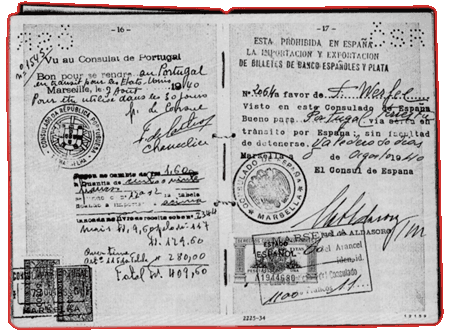 |
 |
Werfel's Czech passport
Werfel's Czech passport records in detail his efforts
to secure departure from France: first of all, the first
US visa is entered, issued in Marseilles on 14 October
1938; then there is a French exit permit for travel to
Portugal via Spain using the Hendaye border crossing,
issued in Bayonne on 23 June 1940 (neither of these could
be used); next, there is a Portuguese transit visa for
travel to the USA, issued in Marseilles on 7 August 1940,
to be used within 30 days (expired), plus a Spanish transit
permit to Portugal issued in Marseilles on 8 August 1940,
a Portuguese transit visa, issued in Marseilles on 31
August 1940, an entry permit for Mexico, issued in Marseilles
on 27 August 1940, a stamp from the "Nea Hellas"
dated 4 October 1940, and the second entry visa for the
USA dated 22 March 1941 from Nogales on the Mexican border,
further to which, on 18 June, Werfel received his "first
papers" for the US naturalization procedure. |
|
There was talk of a man being sent from America especially
to help us all. We waited; the man did not come. But
what came one day, out of the blue, alone, orphaned
and tattered, was my little trunk with the scores of
Gustav Mahler´s symphonies and Bruckner´s
Third! The efforts of our kindly host in Lourdes had
not been completely in vain, and I did not mind losing
the rest of our possessions as long as I had what was
most important to me.
A telegram carne from New York, advising us that our
American visas had been cabled to the American consul
in Marseille. The taxi ride to the consulate cost a
small fortune. The waiting room was full of excited
people; once again we sat around for hours, and when
we got to see the consul, he knew nothing of a cable.
It was only at our vigorous insistence that he managed
to locate it.
No ships were sailing from French ports, and to embark
for the United States in Lisbon, you needed Spanish
and Portuguese transit visas. With the American visa
in a Czech passport like ours there was no trouble about
getting them; you just had to wait your turn. The refugees
stood in line before the consulates from sunrise until
closing time, if they did not faint in the glistening
heat or leave, to keep from fainting. A man with Werfel's
heart could die on the spot. But all applicants had
to appear in person.
At the Spanish consulate I bribed the doorman to take
our card in, and we were promptly called up out of turn
and issued visas. I tried this on the Portuguese doorman,
too, but there it did not work; the man returned the
card to me as undeliverable. We went to the end of the
line. It inched forward with maddening slowness. At
high noon the pavement seemed to melt under our feet.
Werfel kept mopping his brow. His eyes burned in his
dripping face; he suddenly looked ashen. I was desperate
and ready to give up when a young Austrian acquaintance
of ours approached. 'That's impossible,' she said indignantly.
'Why should Franz Werfel stand in line like this?"
We knew Hertha Pauli from Vienna, where she had been
one of Paul Zsolnay´s promising authors, and had
met her again in Paris and recently in Lourdes. She
had just happened to pass by; she could not hope for
a visa herself, because she had no passport. I explained
to her that our card had failed to go through. 'Wait
a minute,' she said, and disappeared.
|
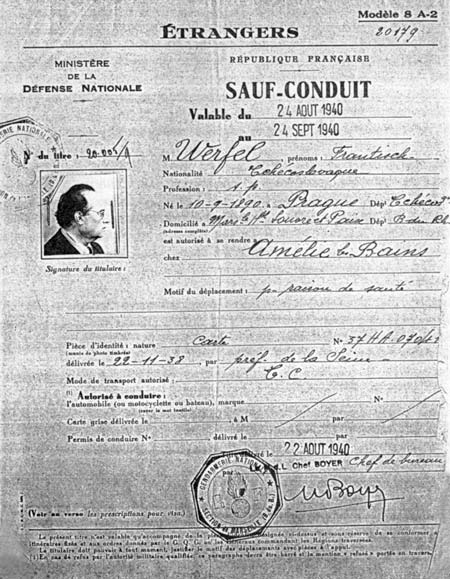 |
 |
| Franz Werfel's laissez-passer,
valid for one month (25 August to 24 September 1940) |
|
In two minutes she was back beaming. 'Come,' she said.
'You’ll have to sit down, first of all. The consul
expects you at four.’ I really had to sit down.
Werfel kept mopping his brow. 'How did you manage that?'
I asked. 'I called up,' she said simply. 'When I mentioned
your name the consul came right to the phone. He is
an old admirer of yours,’ she told Franz Werfel.
Then she turned back to me. 'l hope you’ll forgive
me but I had to call as Madame Werfel.' We laughed aloud,
for the first time in weeks, and headed for nearest
bistro. 'That calls for champagne,' I declared.
Punctually at 4 p.m. we got the visas. In exchange,
Werfel had only to autograph the consul's Portuguese
edition of Musa Dagh. (Subsequently, through the Czech
consul, an angel of a man, Werfel got Czech passports
for a score of stateless refugees, including Hertha
Pauli, who had aided us.)
Soon after we got our visas, the much-talked-about
American came to Marseille. He was Varian Fry, the representative
of the Emergency Rescue Committee, which had been formed
in New York for the purpose of bringing the political
and intellectual refugees of unoccupied France before
the Germans got them. Mr. Fry did the job, but his laconic
manner and expressionless face made him appear to be
doing it gruffly and grudgingly. He came to our hotel,
had dinner with us, and then dragged out our departure
for two more weeks in a wild-goose chase after a ship.
This, of course, fell through, and on 11 September he
finally told us to be ready to leave by rail the next
morning at five, together with Heinrich Mann and his
wife and nephew Thomas Mann's son Golo.
There was no time to lose. From Mr. Fry's hotel we
rushed back to ours, where Werfel burned all his writings
and drafts in a small ash tray while I was busy packing
- for, as by a miracle, the rest of our lost luggage
had also caught up with us. Our friend Frau Meier-Graefe
stayed up with me all night until it was time to leave.
Mr. Fry and another young American got on the train
with us. In Perpignan we waited several hours for another
train, which took us to the border town of Cerbére
by nightfall. The two Americans hoped that our American
visas would get us through on the train, even without
French exit visas. This gambit failed, unfortunately,
so we took rooms at an otherwise deserted inn and waited
for orders.
In the morning I rose early. Unable to stand it long
at the eerie empty inn, I went to the station, where
we had arranged to meet. There was no breakfast to be
had, just tea. We held a war council. The police, the
Americans told us, had repeated their refusal to let
us cross the border on the train, so we came to the
decision to try on foot although Heinrich Mann was seventy
and Werfel had a heart ailment.
Mr. Fry, the only possessor of an exit visa, would go
on the train with the luggage and await us at the Spanish
border town of Port Bou, while his young colleague would
guide us over the hills. We had to go soon - the Spanish
sun was infernally hot at six o'clock already - but
Golo, usually a most reliable young man, was nowhere
to be found. Two valuable hours passed before he came
back, refreshed, from a swim in the Mediterranean and
we could set out to climb the Pyrenees.
In the village it suddenly struck Nelly Mann that it
was Friday, the thirteenth. She wanted to turn back.
Werfel and I walked ahead, to put an end to the hysterical
squabble; we were supposed, after all, to be innocent
excursionists. The village scarcely lay behind us when
the young American turned off the road and uphill, on
a steep, stony trail that soon vanished altogether.
It was sheer slippery terrain that we crawled up, bounded
by precipices. Mountain goats could hardly have kept
their footing on the glassy, shimmering slate. If you
skidded, there was nothing but thistles to hold on to.
After a two-hour climb the youth bade us farewell and
hurried back to show this "road' to the Manns.
We stood alone on the mountaintop. In the distance we
saw a hut shining white on the white rock. This was
the Spanish border post, where we were to present ourselves.
Laboriously we crawled downhill; trembling, we knocked
on the door, which was opened by a dull-faced Catalan
soldier who knew Spanish only. His understanding was
somewhat improved by the packets of cigarettes we slipped
into his pocket. He grew friendlier and motioned to
us to follow him. At last we could walk on a passable
road - but where was this idiot taking us? Back to the
French border post!
We were brought before an officer. I was wearing old
sandals and lugging a bag that contained the rest of
our money, my jewels, and the score of Bruckner's Third.
We must have looked pretty decrepit, surely less picturesque
than the stage smugglers in Carmen. After the march
in the broiling sun we felt utterly wretched. In a sudden
burst of kindliness, the officer waved us through.
Tired, perspiring, we unsteadily retraced our steps,
clambered over the dramatic iron chains that separate
France from Spain, and continued our descent after the
soldier had telephoned down to the custom-house. On
the road I found half a horseshoe and picked it up;
we took it for a good omen and walked more cheerfully.
It had grown late in the day. The heat was unimaginable.
In Port Bou we did not see any officials; they were
probably taking their siesta. But the custom-house porters
- whom we had approached with deference at first, mistaking
them for Government functionaries - were oddly amiable,
promised us good luck, brought wine, and cursed Franco
and Mussolini. Catalonia was apparently still anti-fascist,
and we took courage in spite of our great weariness.
At last, our travel companions arrived. We pretended
to be mere casual acquaintances, though I hastily whispered
to Golo to tip the porters, who had already been discussing
the fact that there was a son of Thomas Mann in our
group. When we had given them virtually all our French
francs, they could not do enough for us, telephoned
for the best rooms in town, and fought over our bags
when we were finally summoned to the custom-house.
Then came the dreaded moment: the passport control.
And, as always, it turned out that the really dangerous
situations have to be faced quite alone. There was no
American in sight, no one to help.
Like poor sinners we sat in a row on a narrow bench
while papers were checked against a card index. Heinrich
Mann, greatly endangered because of his leftist tendencies,
was travelling with false papers, under the name of
Heinrich Ludwig; Werfel, travelling under his own name,
had heard in Marseille that Hitler himself had put a
price on his head; Golo Mann was in danger as his father’s
son. Yet Golo sat quite calmly reading a book, as if
the whole business did not concern him. Nelly Mann had
half carried her aged husband over the thistly mountainside,
and her stockings hung in shreds from bleeding calves.
After an agonizing wait we all got our papers back,
properly stamped, and were free to continue through
Spain. When I think how many killed themselves up there
on the hill or landed in Spanish jails, I see how lucky
we were to have our American scraps of paper honoured
by the officials at Port Bou.
Discharged, we found Mr. Fry, who had our luggage,
and in gathering dusk we walked together to the hotel
where the porters had reserved rooms for us. It had
been almost completely bombed out in the civil war;
only a primitive dining-room and three or four shabby
bedrooms were still standing. The house looked like
all of Spain, like one bleeding wound. Late that evening
the mayor of the town performed a marriage ceremony
in the dining room of the hotel, because the courthouse,
also, had been pulverized.
We slept as if never to awaken. Then, with a shock,
we were aroused at 4 a.m., for at six our train was
to leave. I still do not know why all trains throughout
our flight always left between three and six in the
morning.
> top
Lisbon
We rattled to Barcelona, a war-devastated, starved,
impoverished city that must have been beautiful once.
In the afternoon Werfel and I sat before a café,
and poor children licked the melted ice-cream off our
plates. We paid with tattered old stamps. Everything
was crumbling and desolate. But we began to breathe
easier in the two days we spent in Barcelona, waiting
for the first plane on which two seats to Lisbon were
to be had. The seats went to the Heinrich Manns, as
the most endangered, and we, with Golo Mann and Mr.
Fry, travelled fifteen hours by rail to Madrid, once
more jammed eight in a compartment.
|
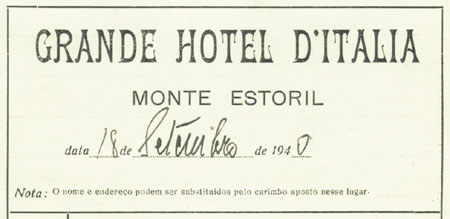 |
 |
| Alma and Franz Werfel's
registration form for the Grande Hotel d'Italia Estoril
dated 18 September 1940. They are both recorded as having
"Czechoslovak" nationality. It is interesting
to note that here, exceptionally, Alma signed her name
as "Alma Werfel-Mahler" and not - as otherwise
her whole life long - "Alma Mahler-Werfel".
As reference documents, both used travel papers from the
American Foreign Service. They left the hotel on 18 October
1940. |
 |
| >
Detail View |
|
 |
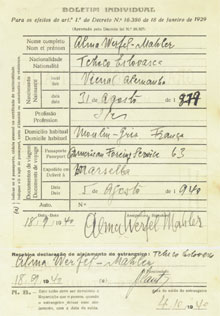 |
|
|
From Madrid, Werfel and I flew to Lisbon. It was evening
when we landed there at a new, unfinished, unlighted
airport; as everywhere, we were kept standing around,
senselessly, for hours. The passport examiner scrutinized
a list of Werfel's works which had been added to a letter
of recommendation by the Duke of Württemberg, a
high-ranking cleric. When he came to the title Paul
Among the Jews, the official frowned. "I see -
you're of Jewish descent?”
Werfel did not say yes or no. In his confusion he merely
pointed at me, and the official sneered, as if to indicate
that Werfel's descent was obvious to everyone. Then
he gave us the stamp that meant admission to Portugal.
I can never forget those first days of paradisiacal
peace in a paradisiacal country, after the torment of
the previous months!
|
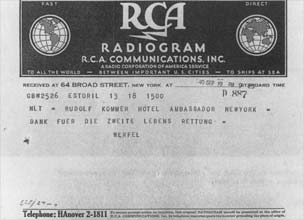 |
 |
"Thank you for saving my life a second time"
- telegram written by Franz Werfel in Estoril to
Rudolf Kommer, dated 19 September 1940 |
|
|
> top
The "New Hellas”
Two more weeks had to be spent waiting at a hotel near
Lisbon, until we got passage on the Nea Hellas, the
last ship to make a regular run to New York. On the
day of embarkation, when I went to pay our hotel bill,
the clerk seemed to sense that it would leave me short
of cash. "Never mind paying the bill,” he
said. "I’II advance it for you, and you can
send me the money from New York.”
"The kindness of a perfect stranger,” I wrote
in my diary, "has reconciled me with mankind ...”
|
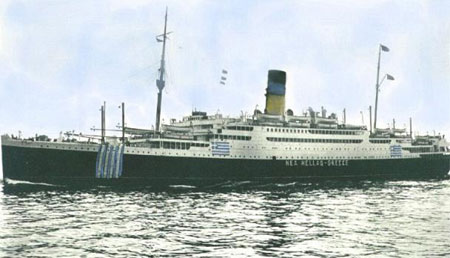 |
 |
| The "Nea Hellas", the last
official ship from Lisbon to New York in 1940, bearing
a Greek ensign |
|
The sea was dull. It always is; only the coasts are
interesting, and those only if they are inhabited. We
hardly went on deck. We spent most of the time in our
cabins, reading and talking, took no part in the lifeboat
drills, and wearily dragged ourselves to the shabby
dining-room. On this voyage we were really 'lost to
the world'.
Nothing from outside could touch us. We were overwhelmed
by the pressure of past experiences and the anticipation
of freedom. At sea we heard that the war had come to
Greece. The report proved to be three weeks early, yet
we felt that in all probability our old Greek ship was
making her last crossing. Then we began to get radiograms,
from New York. America was drawing near, and our strength
returned. On 3 January, I94I, Franz Werfel started working.
"Thank God,” I wrote in my diary. "How
wonderful that he can concentrate again! It's Bernadette
churning in his mind ... ”
Five months earlier, on our last day in Lourdes, he
had disappeared for a while. I did not ask where he
had been, but he told me himself. "I’ve made
a vow,” he said frankly. "If we get to America
all right, I’II write a book in honour of Saint
Bernadette."
> top
New York
Since then, the Nea Hellas had brought us safely to
New York. Feeling young and courageous, we disembarked
on I3 October, I940. (Yes, on the thirteenth-!) At last
we set foot on soil that was really free. If I had not
felt embarrassed before the others, I should have kissed
the American earth.
|
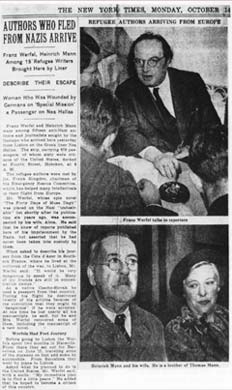 |
 |
 |
|
Above: Alma disembarking from the "Nea Hellas"
in Hoboken, New Jersey, on 13 October 1940. Behind
her (partly hidden), Nelly Mann, Heinrich Mann's
wife
Left: Report in the New York Times, 14 October
1940: The refugee authors, including Franz Werfel,
Alfred Polgar, Heinrich and Golo Mann, were interviewed
before they even left the pier. They only gave
a vague description of their escape route, so
as not to endanger those left behind who were
still awaiting rescue.
|
|
|
The landing in New York Harbour was as grandiose an
experience as ever. A mob of friends awaited us on the
pier; all of them were in tears, and so were we. We
spent close to ten weeks in New York - a time of rather
too much commotion, but also of love, friendship, excitement,
and blessed freedom.
Two days after Christmas we left for the West Coast.
|
| |
|
|
| |
|
|
